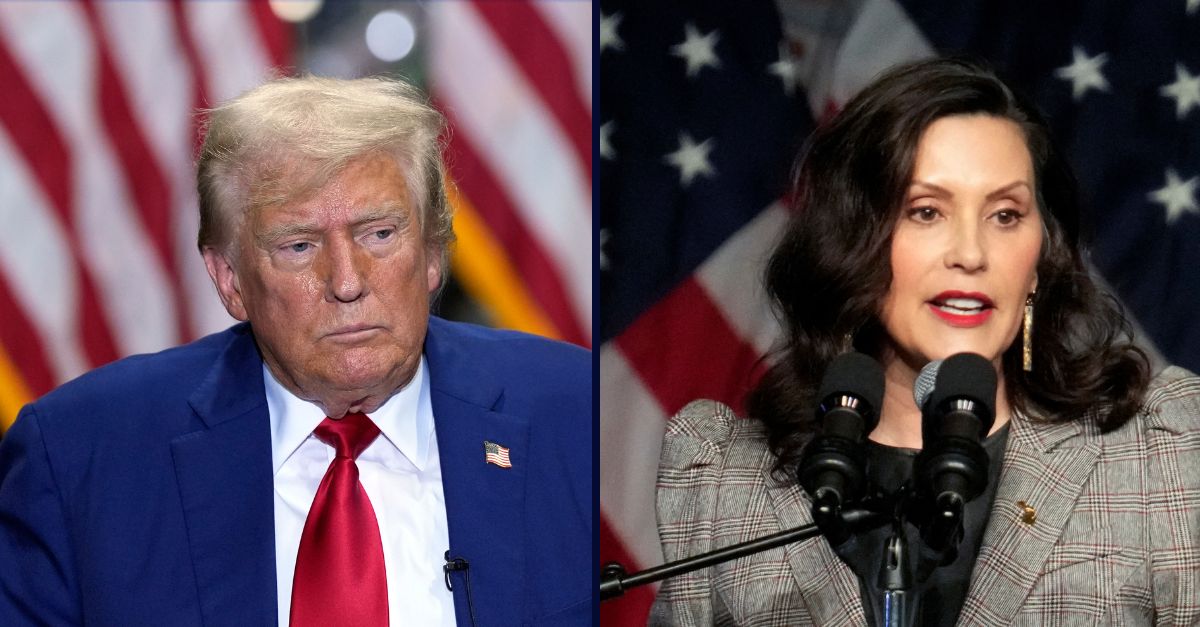
Left: Republican presidential nominee former President Donald Trump listens at a business roundtable discussion at a campaign event at Precision Components Group, Monday, Aug. 19, 2024, in York, Pa. (AP Photo/Julia Nikhinson). Right: Gov. Gretchen Whitmer speaks at the NAACP Detroit branch Fight for Freedom Fund dinner in Detroit, Sunday, May 19, 2024 (AP Photo/Paul Sancya).
The Trump campaign and Republican National Committee accused Michigan Gov. Gretchen Whitmer of trying to “significantly change” election laws ahead of what could be a key battleground state to decide the 2024 presidential election.
It’s part of the federal lawsuit Trump and the RNC brought against Whitmer and other Michigan officials in July for her executive order last year establishing Voter Registration Agencies (VRAs) at the Department of Veterans Affairs and Small Business Administration, among other government offices.
Whitmer in her directive invoked the National Voter Registration Act which Congress passed in the early 1990s. One of its requirements is that state’s must designate registration sites at government offices in addition to local clerk’s offices. But Trump, who is joined in the lawsuit by the RNC, Michigan Republican Party and a local clerk, argues Michigan law states that the state Legislature, not the governor, are the designees of VRAs.
The governor of the Mitten State filed a motion to dismiss the lawsuit, arguing Trump’s “claims are without merit and must be dismissed for three reasons.” First, the state says since the plaintiffs claim that only state law has been violated, the Eleventh Amendment bars it from being filed in federal court. Second, the plaintiffs “have not alleged an injury in fact that is concrete and particularized under any theory.” Finally, the defendants argue that Michigan Election Law authorizes Whitmer to designate state agencies to perform voter registration services.
On Friday, the Trump campaign filed a response to the motion to dismiss, urging the judge to keep the lawsuit afloat. The former president’s legal team argues the state’s argument is “predicated upon an ‘unjustifiably strict view of standing’ that conflates ‘standing doctrine with the merits’ that appears to have arisen out of a post-2020 ‘zeal.’”
Trump says the judge should “reject” Whitmer’s argument, “especially in the context of this particular election.” From the motion (citations omitted):
In just the last few months the State Defendants have (1) tried to significantly change Michigan election laws under the guise of a “manual,” (2) sought to immediately enact administrative rules that would limit recounts, even though the enabling legislation won’t take effect until months after the election, (3) resisted, on mootness and standing grounds, litigation to clean up the voter rolls, and (4) taken extraordinary measures to keep certain Presidential candidates off and certain candidates on the ballot And all of this is happening in the midst of unprecedented “border crisis” and the resulting concerns about ineligible persons casting votes.
The motion says NVRA requires states to establish VRAs, but does not say how to do so. It’s a “mixed question” of state and federal law, plaintiff lawyers argue. Whitmer and Secretary of State Jocelyn Benson, who also is named in the suit, “go beyond the statutory framework provided by the Legislature.” Per the motion, after the registration act was passed by Congress, Michigan’s then-Gov. John Engler issued an executive order in 1995 establishing voter registration at some public-assistance agencies. No other governor established VRAs since then, Trump’s lawyers noted.
“The Michigan Legislature did not authorize the Governor to unilaterally designate any VRAs after February 9, 1995,” the motion says.
In 2021, President Joe Biden signed an executive order directing state and federal agencies to work together to promote increased voter registration and participation. In response, Whitmer said it was time to “review and update” the list of VRAs and she directed Benson to work with Veterans Affairs and the SBA to establish them. Benson’s “negotiation of such agreements was consistent with her responsibility to coordinate the requirements of the NVRA,” the Michigan AGs office wrote.
Attorneys for Trump say Whitmer’s directive “undermines the integrity of elections by increasing the opportunity for individuals to register to vote even though they are ineligible to do so.” The plaintiffs claim they must “deploy their time and resources to monitor Michigan elections for fraud and abuse.”
“But they provide no factual support for such concerns — they identify no incidents of any fraud or abuse related to registration activities conducted by VRAs,” the AG wrote. “Merely invoking ‘the possibility and potential for voter fraud’ based only on ‘hypotheticals, rather than actual events,’ is insufficient to support an injury.”
Have a tip we should know? [email protected]




